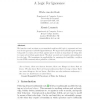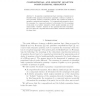1121 search results - page 46 / 225 » Logics of Complementarity in Information Systems |
ICLP
1997
Springer
14 years 1 months ago
1997
Springer
We provide a method whereby, given mode and (upper approximation) type information, we can detect procedures and goals that can be guaranteed to not fail (i.e., to produce at leas...
PODS
2009
ACM
14 years 9 months ago
2009
ACM
The paper investigates the question of whether a partially closed database has complete information to answer a query. In practice an enterprise often maintains master data Dm, a ...
DALT
2003
Springer
14 years 2 months ago
2003
Springer
We introduce and motivate a non-standard multi-modal logic to represent and reason about ignorance in Multi-Agent Systems. We argue that in Multi-agent systems being able to reaso...
DLOG
2010
13 years 6 months ago
2010
Dynamic epistemic logic plays a key role in reasoning about multi-agent systems. Past approaches to dynamic epistemic logic have typically been focused on actions whose primary pur...
NC
2007
13 years 8 months ago
2007
In quantum computational logic meanings of sentences are identified with quantum information quantities: systems of qubits or, more generally, mixtures of systems of qubits. We co...


